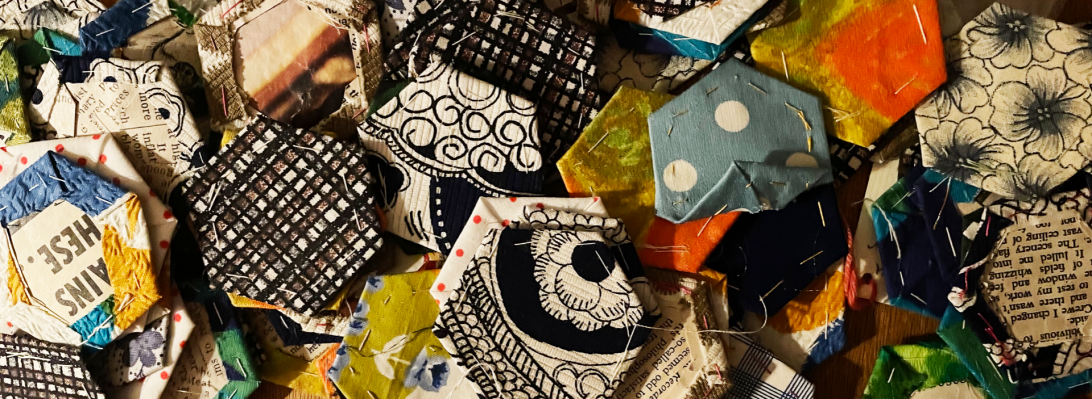The Domestic Academics: Finding the time to write and care. Storying the gendered inequalities of academic research in the global pandemic
Welcome to an exciting new practice-based research project, which aims to give women academics from across the UK an opportunity to collaborate with others to share and visualise their experiences of the Covid-19 lockdown from March 2020 to March 2021.
The key practice output will be a quilt, displayed as an interactive website page with 3-minute voiceovers from the academics, accessed by clicking on respective quilt pieces. This collaborative project aims to generate new knowledge and allow measures to be identified to tackle the gender inequalities that have arisen.
The panels can be drawn, collaged, stitched or made from any type of visual and physical media. The inspiration and presentation are quilt-based, but not necessarily the making.
Because Covid-19 restrictions still apply and those participating will inevitably continue to juggle their commitments, the making of the quilt will be supported by two online workshops. Anticipated time commitment per applicant is not more than 2-3 days between May and July 2021.
The call for participants is now live, if you’d like to apply please visit my Call for Participants .
The research will be disseminated online, via a physical exhibition (when Covid restrictions permit) and through the publication of a textual output.
This project is urgently required to address the major injustice that threatens to significantly impede the developing careers of women academics with caring responsibilities. Early research statistics, reported as early as Spring 2020 in the Guardian and Inside Higher Ed,* indicate that the number of women contributing to academic Journals since the pandemic began has dropped, whereas male contributions have risen. Studies also show that mothers spend over 50% more of their time supporting home schooling and completing domestic tasks, in comparison to their male partners. By moving the work place to combine with domestic set-ups, without the opportunity for notice, prior consultation nor mitigation for the associated challenges, these women continue to experience significant mental strain and an unequal increase in their workloads. This indicates an inequality as a direct result of the COVID-19 lockdown and ongoing prevalence towards working from home.
This project aims to:
– document the impact of COVID-19 on the working lives of women academics
– inform future practices and initiatives to support women and prevent gender-based discrimination
– protect women academics roles and credibility
– protect and value women academics contribution to university research outputs and growth
– create awareness of the inequalities faced by women academics with caring responsibilities
– provide a bedrock for discussion that entices change
– uniquely engage the audience through creative narrative and visual outcomes
– create an output that is easily accessible and shareable online
– share outcomes UK wide (and worldwide)
– create an output that can be shared in a variety of contexts (e.g. conference, textual output, exhibition)
– create an output with scope for growth and increased impact
– entice policy change to ensure contracts are not detrimental to women and support acknowledgement without penalisation of reduced research output for REF 2024
The quilt will target the need for tacit knowledge of these experiences to be acknowledged and made accessible in order to entice change. By enabling experiences to be creatively expressed and performed, both visually and aurally online, this work can provide the bedrock for discussion and consultation to support the subsequent identification of the actions required to address and reconcile this inequality. This situation and the scale of its impact is unprecedented, therefore knowledge of its effect on women’s academic careers is needed, but does not yet exist. In order that this significant and valuable proportion of staff can continue to build their careers without discrimination and contribute to the successful research growth of their Universities, action must be taken swiftly.
*https://www.insidehighered.com/news/2020/04/21/early-journal-submission-data-suggest-covid-19-tanking-womens-research-productivity








